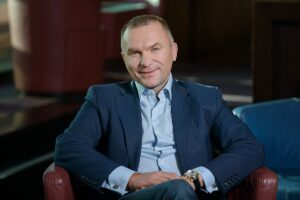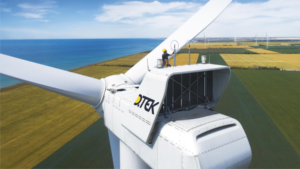
Japan’s Toyo Tires has announced plans to build an innovation center in the city of Injiya, Serbia. The new facility will focus on research and development in the tire industry and related technologies, a Toyo representative told local business media.
According to the project, the center will include laboratories for materials science, test benches, and research units that will collaborate with regional universities and technology startups. Construction is expected to begin in the first quarter of 2026.
Toyo Tires also plans to integrate the Serbian center into the company’s global research network, facilitating the exchange of knowledge and resources between its sites in Asia, Europe, and America. This will help accelerate the development of new compounds, innovative mixtures, and environmentally friendly solutions.
Investing in Serbia as part of this project is seen as the second stage of Toyo’s expansion in the Balkans — the company already has production facilities in Serbia and now intends to strengthen the scientific and technical core of its business.
Toyo Tires is a global tire manufacturer based in Japan. The company has been in operation since 1945 and manufactures tires for passenger cars, SUVs, trucks, and specialized equipment.
Toyo is known for its innovative solutions in the field of compounds, environmentally friendly compositions, and high testing standards. The company supplies products to more than 100 countries around the world, and its research and development network includes centers in Japan, the US, Europe, and Asia.
Toyo also actively collaborates with automotive brands and participates in motorsports, which allows it to test and develop technologies under extreme conditions.
Japan’s Toyo Tires to build innovation center in Serbia
Source: https://t.me/relocationrs/1590

The U.S. Development Finance Corporation (DFC) has approved a loan of up to $40 million for Astarta, Ukraine’s largest sugar producer, at the sub-council level.
“(The loan) will assist in the construction and operation of a soy protein processing plant with a projected annual capacity of about 100,000 tons and help Astarta make other investments,” DFC said on its website.
At the same time, the International Finance Corporation (IFC) of the World Bank Group announced at the end of November 2024 that it was considering a $40 million loan to Astarta and a parallel $40 million loan for the construction of a soy protein concentrate plant in Poltava region. The recipient of the funds is Astarta Agro Protein LLC, a subsidiary of Astarta Holding plc.
It was noted that IFC has already assisted the agricultural holding in conducting market research, preparing a business plan for the project, and assessing its commercial viability in order to interact with potential investors.
Initially, the IFC Board of Directors planned to consider this project on December 20, but then postponed it to February 28, 2025.
As reported, in 2024, Astarta began investing in the construction of a plant for processing soybean meal into soy protein concentrate with a capacity of 500 tons per day (about 100 thousand tons per year) in the Globinsky Industrial Complex (Poltava region). The agricultural holding will invest over EUR 76 million in equipment and technology and create 110 new jobs.
“Astarta and its structural unit Astarta Agro Protein signed the first investment agreement with the Ukrainian government to receive compensation from the state for significant investments. As part of the agreement, the government will provide the agricultural holding with a number of incentives, including exemptions from import duties on new equipment, import VAT on new equipment and income tax for up to 5 years.
IFC recalled that Astarta commissioned a soybean processing plant in Globyno in December 2013. In 2023, it processed 232 thousand tons of soybeans, 73% of which were grown by the agricultural holding, and produced 172 thousand tons of soybean meal. In the first half of 2024, the share of the plant’s own raw materials increased to 90%.
Soybean concentrate is produced by processing soybean meal with higher added value. It serves as a raw material for the production of animal feed.
In 2023, the agricultural holding reduced its net profit by 5.0% to EUR61.9 million, and its EBITDA decreased by 6.1% to EUR145.77 million, while revenue increased by 21.3% to EUR618.93 million.

Ukraine plans to build 16 international automobile checkpoints on its border with the EU by 2030, according to the Operational Plan of the Strategy for the Development of Border Infrastructure with the EU and the Republic of Moldova until 2030 on the Cabinet of Ministers’ website. The plan envisages the construction of a checkpoint for road traffic “Varyazh” in Lviv region. The necessary UAH 35 million will be allocated in 2026 from the state or local budgets.
Funding for the construction of the Zabrid checkpoint in Zakarpattia region will also begin in 2026 – UAH 24 million of the required UAH 456.8 million is expected to be allocated. In 2027, UAH 280 million will be allocated, and in 2028, UAH 152.8 million will be financed from the state or local budgets.
The construction of the Palad-Komarivtsi BCP in Zakarpattia region will begin in 2027 – UAH 8 million will be allocated out of the UAH 485.6 million required for the construction of the BCP and its service area. In 2028, UAH 320 million will be allocated for the project, and in 2029 – UAH 157.6 million from the state or local budgets and international technical assistance.
In 2025, funding will be allocated for the Solomonovo checkpoint in Zakarpattia region – UAH 798.3 million will be allocated out of the UAH 8 million needed to build the checkpoint and its service area. In 2026, the project will receive UAH 180 million, in 2027 – UAH 410 million, and in 2028 – UAH 200 million from international technical assistance and the state budget.
In addition, the construction of the Dyida automobile checkpoint is planned in Zakarpattia region – UAH 1.5 million of the required UAH 1.08 billion has already been allocated in 2024. In 2026, it is planned to allocate UAH 355 million, in 2027 – UAH 400 million, in 2028 – UAH 333.05 million at the expense of the state budget and international technical assistance, in particular, the CEF.
It is also planned to build the Velyka Palad automobile checkpoint in the Zakarpattia region. Out of the UAH 386.01 million required for the construction of the checkpoint and its service area, UAH 1.45 million was allocated in 2024. In 2025, UAH 382.56 million will be allocated from the state budget and international technical assistance.
The construction of the Khyzha checkpoint in Zakarpattia region is scheduled to begin in 2026, with UAH 2 million allocated out of the UAH 59.02 million required for the construction of the checkpoint and its service area. In 2027, UAH 37 million is allocated for the project, and in 2028 – UAH 20.02 million from the state or local budget, at the expense of international financial assistance.
In 2026, the construction of the Yablunivka checkpoint in Zakarpattia region will also begin – UAH 5 million will be allocated out of the UAH 221.02 million required for the construction of the checkpoint and its service area. In 2027, UAH 216.02 million will be financed from the state or local budgets and international technical assistance.
Construction of the Bila Tserkva checkpoint was launched in 2024, with UAH 19.5 million allocated out of the required UAH 1.51 billion for the construction of the checkpoint, access roads and a road border bridge. UAH 174.08 million is expected to be allocated in 2025, UAH 963.42 million in 2026, and UAH 362.5 million in 2028 from the state budget and international technical assistance.
In the Chernivtsi region, the construction of the Ruska checkpoint is planned, for which UAH 210 million will be allocated from the state budget in 2026 and 2027 out of the UAH 105 million required to build the checkpoint and provide transport links to it.
The construction of the Shepit checkpoint in the Chernivtsi region is also planned for 2026, with UAH 92.5 million allocated out of the UAH 185 million required for the construction of the checkpoint and transport links to it. A similar amount will be allocated from the state budget in 2027.
In 2026, the construction of the Bila Krynytsia checkpoint will begin in Chernivtsi region – UAH 26.5 million will be allocated out of the UAH 626.54 million required for the project. In 2027 and 2028, UAH 300 million is expected to be allocated from the state budget and other sources not prohibited by law.
The construction of the Kelmentsi PP in the Chernivtsi region is already underway – in 2024, UAH 750 thousand out of the required UAH 175 million were allocated for the project. In 2025, UAH 87.12 million is expected to be financed, and in 2026 – UAH 87.12 million.
For the construction of the Vashkivtsi PE in the Chernivtsi region, UAH 60 million out of the required UAH 120 million will be allocated from the state budget in 2025. The remaining amount will be financed in 2026.
The construction project of the Bronnytsia-Ungur BCP in Vinnytsia region will also receive funding in 2025 – UAH 50 million out of the required UAH 62.1 million will be allocated from the state budget. In 2024, UAH 2.1 million was allocated for the project.
The construction of the Vynohradivka BCP in Odesa region will continue – in 2025, UAH 3.1 million will be allocated out of the UAH 119.4 million required for the project, in 2026 – UAH 59.4 million, and in 2027 – UAH 55.32 million. In 2024, the project received funding of UAH 1.5 million.
As reported, Ukraine will increase the number of BCPs for road and rail transport to 74 by 2030.
As of May 1, 2024, the passage of persons and vehicles across the state border to/from Ukraine is carried out at 41 checkpoints for road transport (the Republic of Poland – eight points, the Slovak Republic – two points, Hungary – five points, Romania – five points, the Republic of Moldova – 21 points). Also, as of July 31, 2024, there are 16 checkpoints for railroad traffic (the Republic of Poland – five checkpoints, the Slovak Republic – two checkpoints, Hungary – two checkpoints, Romania – two checkpoints, the Republic of Moldova – five checkpoints).

Zakhidnyi Buh PE will build a processing complex for processing soft and durum wheat into flour with a capacity of more than 75 thousand tons per year, Volodymyr Boichuk, the company’s project manager for the Mill and Pasta Factory, said on Facebook.
“This will be the first project of this scale in Ukraine to process durum wheat, which we will launch in 2025. The design capacity of the mills will be more than 75 thousand tons per year. This will make it possible to produce high-quality bakery flour and cereals for pasta production,” he said, adding that preparatory work has already been completed.
At full capacity, the pasta factory is expected to produce about 50,000 tons of various products per year, including traditional pasta of various shapes and instant pasta. The assortment will include more than 50 products.
Zakhidnyi Buh PE was founded in 2003. It cultivates about 65 thousand hectares in Chernivtsi, Ternopil, Volyn and Lviv regions. The company specializes in growing grain and industrial crops, producing and selling seeds, and provides services of elevators and an agrochemical laboratory.
It consists of 10 agricultural divisions, three elevators with a simultaneous storage capacity of 88 thousand tons, a seed plant with a capacity of 200 tons per day, an agrochemical laboratory that provides soil and water analysis services, etc.
The beneficiaries of the agricultural holding are Oksana Drul, Valeriy Ovcharuk and Yuriy Gladun.
According to the Opendatabot index, in 2024, Zakhidnyi Buh PE entered the Top 10 most profitable agricultural companies in Ukraine. It accounted for 5.9% of the top ten’s revenue. It is specified that in 2023, the agricultural holding’s revenue amounted to UAH 86.57 billion.

Kryvyi Rih Cement plans to build 24 MW of power generation, the founder of Concorde Capital, Igor Mazepa, said on Facebook.
“We are currently building an independent power generation facility at Kryvyi Rih Cement. We need to generate 24 MW of power. This will be enough to keep the plant running smoothly,” he wrote.
According to him, the project will cost about $15 million, with a payback period of three to four years.
According to Mazepa, “This is a necessary measure to keep the business from stopping. In general, I see the prospect of investing in energy projects. Therefore, in the short term, we will build 40 MW of storage capacity, which will be balancing in the energy market. We see a good ROI of up to 30% depending on the market scenario.”
“Kryvyi Rih Cement (formerly Heidelberg Cement Ukraine) produces construction materials in three areas: cement, concrete, and granite crushed stone. On May 14, 2019, Cypriot Overin Limited, which is affiliated with Concorde Capital, became the owner of the dominant controlling stake in the company.
BUILD, CONCORDE CAPITAL, Kryvyi Rih Cement, power generation - founder

DTEK Energy Holding, through its EU-focused subsidiary DRI, has signed an agreement with Polish company Columbus Energy to build a 133 MW energy storage system in southern Poland.
“On March 27, DRI signed a definitive binding share purchase agreement with Polish company Columbus Energy, which will give it the right to build a 133 MW battery storage facility in southern Poland, subject to permits,” DTEK said in a release on its website on Wednesday.
DTEK notes that this is the largest energy storage system (ESS) project in Poland, and the agreement is its first major infrastructure investment in the country and a key element in the company’s plan to create a pan-European energy system uniting Ukraine and the EU. DTEK’s goal is to create a 5 GW portfolio of renewable energy projects in Europe by 2030 through DRI.
The acquisition of the 133 MW SPP project makes DTEK Group one of the first companies to develop this technology on a large scale in Poland, the release said.
DRI expects to close the deal with Columbus in the coming months and start construction of the facility in Q4 2024 to complete it and put it into operation in early 2026. The project is committed to providing energy capacity to the Polish market for 17 years (from 2027).
“Today’s signing marks an exciting moment in Europe’s quest to move beyond fossil fuels. This project will not only provide vital flexibility on Poland’s path to a renewable future, but will also be an important achievement for Central and Eastern Europe in demonstrating how battery storage can be successfully developed. DTEK’s investments in the country are a crucial step towards the integration of the energy systems of Ukraine and Poland,” said Maxim Timchenko, CEO of DTEK Group, as quoted in the release.
According to Krzysztof Kokhanowski, Vice President of the Board and CEO of PIME, the largest association in the energy storage industry in Poland, it is gratifying to see international energy players like DTEK investing in the Polish battery market through its EU subsidiary.
“Poland is one of the leaders in the European Union in the production of batteries and battery cells, and in the next 5 years it will be one of the leaders in the construction of energy storage facilities based on battery technology. The construction of this new facility will certainly contribute to our country’s efforts,” he said.
According to the release, Poland currently uses 30 GW of coal and natural gas-fired power to balance its energy system, which is increasingly using renewable energy sources and shifting from centralized to distributed generation. The batteries will help to ensure the grid’s performance and provide the power system with a reliable mechanism for balancing the unstable nature of renewable energy.
As reported, DTEK Group implemented a 1 MW pilot project in Enerhodar in 2021, before Russia’s full-scale invasion of Ukraine. It is now under occupation. In early 2024, DRI launched its first projects in Europe: in Romania, the 60 MW Ruginoasa wind farm and the 53 MW Glodeni solar power plant. It also intends to develop renewable energy in Romania, Italy, and Croatia.